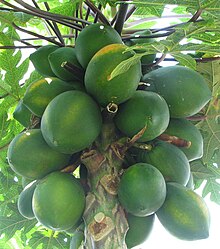Caricaceae
| Caricaceae | |
|---|---|

| |
| Carica papaya | |
| Scientific classification | |
| Kingdom: | Plantae |
| Clade: | Tracheophytes |
| Clade: | Angiosperms |
| Clade: | Eudicots |
| Clade: | Rosids |
| Order: | Brassicales |
| Family: | Caricaceae Dumort. |
| Genera | |
|
See text | |
The Caricaceae are a family of flowering plants in the order Brassicales,[1] found primarily in tropical regions of Central and South America and Africa. They are usually short-lived evergreen pachycaul shrubs or small to medium-sized trees growing to 5–10 m tall. One species, Vasconcellea horovitziana is a liana and the three species of the genus Jarilla are herbs.[2] Some species, such as the papaya, bear edible fruit and produce papain.[3]
Based on molecular analyses, this family has been proposed to have originated in Africa in the early Cenozoic era, ~66 million years ago (mya). The dispersal from Africa to Central America occurred ~35 mya, possibly via ocean currents from the Congo delta. From Central America, the family reached South America 19-27 mya.[4]
The family comprises six genera and about 34-35 species:
| Caricaceae |
| ||||||||||||||||||||||||||||||
References
- ^ "An update of the Angiosperm Phylogeny Group classification for the orders and families of flowering plants: APG III". Botanical Journal of the Linnean Society. 161 (2): 105–121. 2009. doi:10.1111/j.1095-8339.2009.00996.x. hdl:10654/18083.
- ^ Carvalho, Fernanda; Renner, Susanne (2013). "Correct names for some of the closest relatives of Carica papaya: A review of the Mexican/Guatemalan genera Jarilla and Horovitzia". PhytoKeys (29): 63–74. doi:10.3897/phytokeys.29.6103. PMC 3881347. PMID 24399895.
- ^ "Home Page - BRAHMS Online".
- ^ Carvalho, FA; Renner, SS (2012). "A dated phylogeny of the papaya family (Caricaceae) reveals the crop's closest relatives and the family's biogeographic history". Molecular Phylogenetics and Evolution. 65 (1): 46–53. Bibcode:2012MolPE..65...46A. doi:10.1016/j.ympev.2012.05.019. PMID 22659516.
